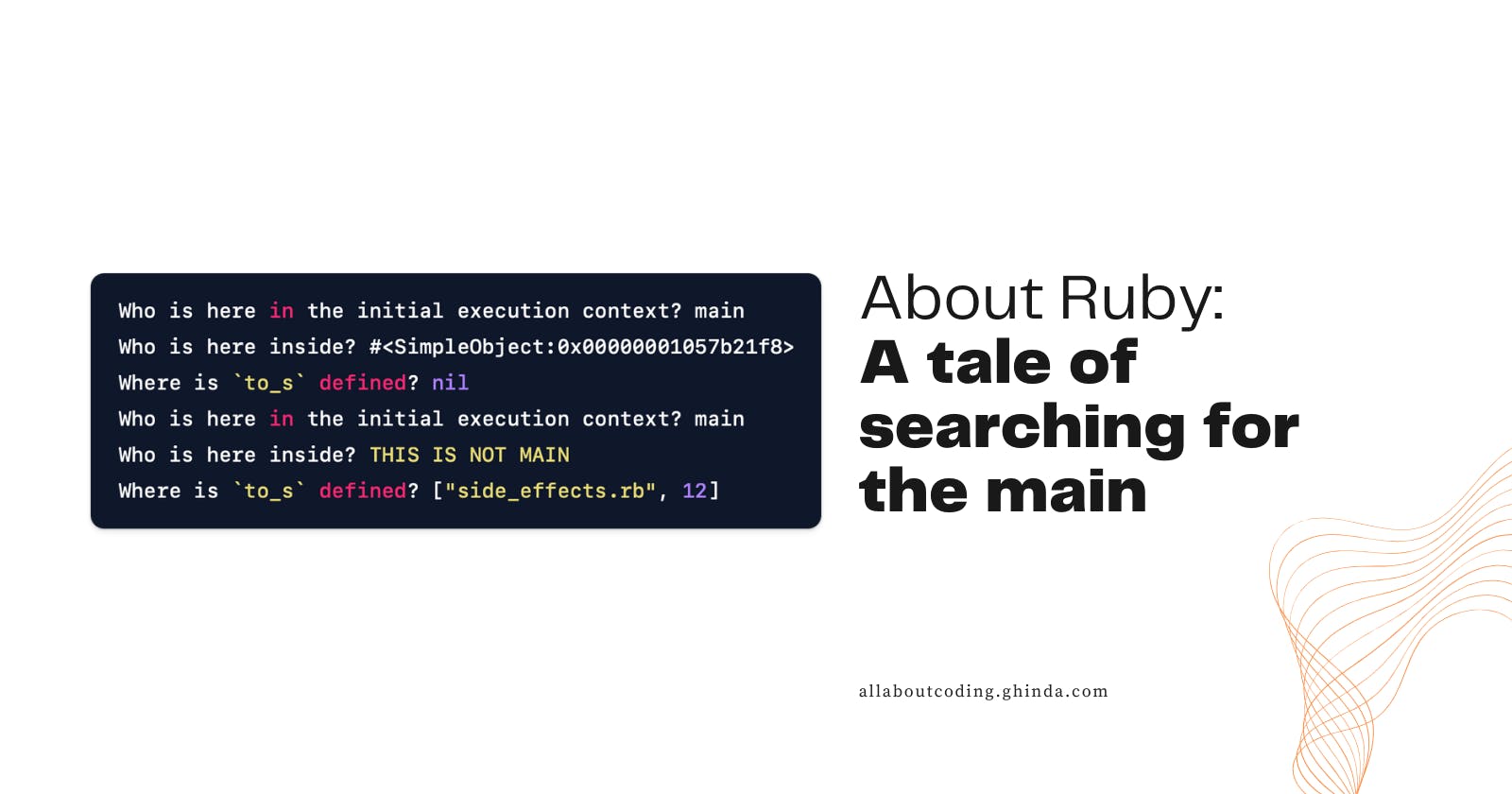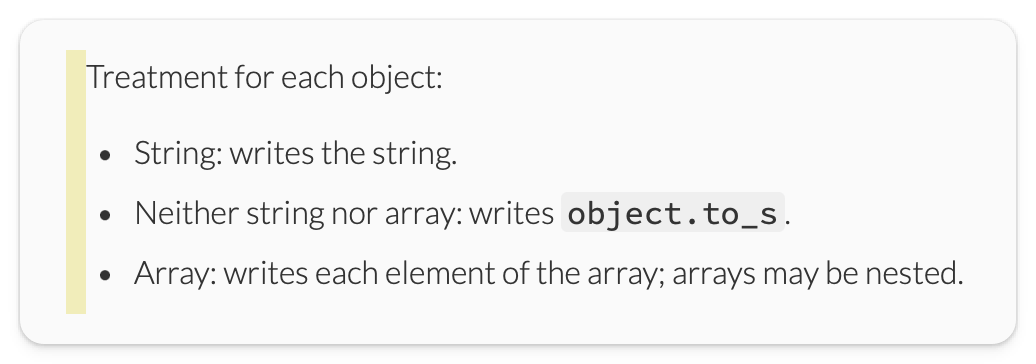About Ruby: A tale of searching for the main
Explore the question: Where is a method defined in Ruby when not defined inside an object?
Here is a fun way to play with Ruby while trying to explore some basic concepts.
If you are learning Ruby, I hope this article demonstrates that Ruby enables excellent self-exploration, and most questions about its functionality can be answered through hands-on experimentation and just a little documentation.
Context
Someone asked me the following question:
When I write in IRB or in a file the following
def my_method
end
Where is the
my_methodcreated? What object will contain this method? And what is the access modifier for this method?
Detective Tools
I will use some simple but powerful tools:
Ruby interpreter installed on the local machine
Ruby documentation at https://docs.ruby-lang.org/en/3.2
Solution
Instead of giving a direct answer, let's put on the hat of an investigator and try to find some clues about this while having fun with Ruby.
First question: When I run a script who is there already?
First, let's create a file called exploration.rb and ask it about self:
# exploring.rb
puts "Who is here? #{self}"
# => `Who is here? main`
We notice this return main. But what is this main?
Maybe we can ask Ruby about it. I will add a couple of methods to find out more about main while trying to dig around:
puts "Who is here: #{self}"
puts "What is your class: #{self.class}"
puts "What are your ancestors: #{self.class.ancestors}"
puts "What is the current exection stack: #{caller.inspect}"
# =>
Who is here: main
What is your class: Object
What are your ancestors: [Object, Kernel, BasicObject]
What is the current caller stack: []
We found out that main exists inside Object. Good, let's poke around then:
puts "Is `main` a public method? #{self.public_methods.include?(:main)}"
puts "Is `main` a public method? #{self.protected_methods.include?(:main)}"
puts "Is `main` a private method? #{self.private_methods.include?(:main)}"
puts "Is `main` a singleton method? #{self.singleton_methods.include?(:main)}"
# =>
Is `main` a public method? false
Is `main` a public method? false
Is `main` a private method? false
Is `main` a singleton method? false
It appears that main is not a method. That seems strange, right? If main is not a method then what could it be?
I think we should now explore how we are asking the question: we are using puts to ask the question. Here is what the documentation says
Then maybe something is deturning the puts self and that something could be a method to_s on Object. Here let's check a bit the documentation for Object#to_s
CLUE A - FOUND -> main is just a string printed by Ruby in the initial execution context. Nothing special here.
Second: Where is a method created when I don't define an object?
For this, we will create a second file called exploration_method.rb and again ask it about itself:
def my_method
puts "Who is here: #{self}"
puts "What is your class: #{self.class}"
puts "What are your ancestors: #{self.class.ancestors}"
puts "What is the current exection stack: #{caller.inspect}"
puts "What is your current file: #{__FILE__}"
end
my_method
# =>
Who is here: main
What is your class: Object
What are your ancestors: [Object, Kernel, BasicObject]
What is the current exection stack: ["exploration_method.rb:10:in `<main>'"]
What is your current file: exploration_method.rb
CLUE B - FOUND -> my_method is created inside Object
Third: What kind of method is my_method?
Let's ask Object about this method:
def my_method
end
puts "Is `my_method` a public method? #{Object.public_methods.include?(:my_method)}"
puts "Is `my_method` a private method? #{Object.private_methods.include?(:my_method)}"
puts "Is `my_method` a private method? #{Object.protected_methods.include?(:my_method)}"
puts "Is `my_method` a singleton method? #{Object.singleton_methods.include?(:my_method)}"
# =>
Is `my_method` a public method? false
Is `my_method` a private method? true
Is `my_method` a private method? false
Is `my_method` a singleton method? false
CLUE C - FOUND -> Seems like my_method is a private method defined on Object
I will try to test this. I know that public_send can only call public methods on an object. And I know that send will call any method.
I will create a simple method that will print self and object_id and try out various things:
def my_method
puts "Who is here: #{self} with object_id #{self.object_id}"
end
my_method
# =>
Who is here: main with object_id 60
What happens if I try the following things:
def my_method
puts "Who is here: #{self} with object_id #{self.object_id}"
end
Object.new.my_method
# =>
testing.rb:5:in `<main>': private method `my_method' called for #<Object:0x00000001054229c0> (NoMethodError)
What about using public_send -> the same result
def my_method
puts "Who is here: #{self} with object_id #{self.object_id}"
end
Object.new.public_send(:my_method)
# =>
testing.rb:5:in `public_send': private method `my_method' called for #<Object:0x0000000105952968> (NoMethodError)
Then send should work:
def my_method
puts "Who is here: #{self} with object_id #{self.object_id}"
end
Object.new.send(:my_method)
# =>
Who is here: #<Object:0x0000000107412960> with object_id 60
So if my_method will be defined on the Object then I must be able to use it in my custom objects right?
def my_method
puts "Who is here: #{self} with object_id #{self.object_id}"
end
class SimpleObject
def test
my_method
end
end
SimpleObject.new.test
Indeed it works! I now confirmed in two ways that my_method is indeed created at runtime in Object
Four: Is my_method defined in Object or added to Object?
Just to push things more, let's try to find out what kind of mechanism is used to add this method to the Object (well from how I formulated this you probably can guess):
def my_method
puts "Who is here: #{self} with object_id #{self.object_id}"
end
class SimpleObject
def test
my_method
end
end
puts "Are you defining `my_method`? #{SimpleObject.private_method_defined?(:my_method)}"
uts "Do you have this method? #{Object.private_methods.include?(:my_method)}"
# =>
Are you defining `my_method`? true
Do you have this method? true
This is a method that was added to the Object and Object is defining this method as a private method.
We can test this by using Object#method_added
class Object
def self.method_added(method_name)
puts "I just added #{method_name.inspect} on #{self}"
end
end
def my_method
puts "Who is here: #{self} with object_id #{self.object_id}"
end
# =>
I just added :my_method on Object
CLUE D - FOUND The method is defined on Object but as a private method. That's why it is accessible everywhere, but that is also why if you add this kind of method, you would be polluting every object with extra private methods if you define top-level methods like that or you might redefine already existing methods.
Five: Is my_method part of BasicObject
In the beginning, I asked this question inside the exploration.rb file:
puts "What are your ancestors: #{self.class.ancestors}"
# => What are your ancestors: [Object, Kernel, BasicObject]
I think it is worth investigating a bit what happens with BasicObject and Kernel.
Question 1: Does BasicObject include my_method?
def my_method
puts "Who is here: #{self} with object_id #{self.object_id}"
end
class AVeryBasicObject < BasicObject
def look_for_my_method
my_method
end
end
begin
AVeryBasicObject.new.look_for_my_method
rescue NameError => _
puts "`my_method` is not here"
end
# => `my_method` is not here
BasicObject does not include my_method
Question 2: Does Kernel module include my_method?
First I will include Kernel and test to make sure it is included properly by testing that the newly created object has puts
class AnObjectWithKernel < BasicObject
include ::Kernel
def a_method
puts "Inside AnObjectWithKernel - it now includes puts"
end
def look_for_my_method
my_method
end
end
obj = AnObjectWithKernel.new
obj.a_method
# => Inside AnObjectWithKernel - it now includes puts
begin
obj.look_for_my_method
rescue NameError => _
puts "`my_method` is not here"
end
# => `my_method` is not here
Kernel does not include my_method
Conclusion
In conclusion, when defining a method without specifying an object in Ruby, the method is created as a private method inside the Object class.
This method can be called on any custom object, as it is added during the execution of the file.
Make sure you are not defining in the main context a method that is already defined by Object, Kernel or any other classes by Ruby cause that will create some not-wanted side effects.
Check out the result of executing the following code that I added inside a file called side_effects.rb:
class SimpleObject
def my_method
puts "Who is here inside? #{self}"
puts "Where is `to_s` defined? #{method(:to_s).source_location.inspect}"
end
end
puts "Who is here in the initial execution context? #{self}"
SimpleObject.new.my_method
def to_s
"THIS IS NOT MAIN"
end
class SecondSimpleObject
def my_method
puts "Who is here inside? #{self}"
puts "Where is `to_s` defined? #{method(:to_s).source_location.inspect}"
end
end
puts "Who is here in the initial execution context? #{self}"
SecondSimpleObject.new.my_method
The output will be:
Who is here in the initial execution context? main
Who is here inside? #<SimpleObject:0x00000001057b21f8>
Where is `to_s` defined? nil
Who is here in the initial execution context? main
Who is here inside? THIS IS NOT MAIN
Where is `to_s` defined? ["side_effects.rb", 12]
Notice that to_s from SecondSimpleObject has now the value THIS IS NOT MAIN and it is reported to be defined in side_effects.rb file?
Updates
- Ufuk Kayserilioglu gave me valuable feedback on an earlier version of this article that I incorrectly used
method_defined?instead ofprivate_method_defined?in the section about if method was added or defined. Thus I refactored that section and now it states clearly thatmy_methodis defined as a private method on theObject
Enjoyed this article?
👉 Join my Short Ruby News newsletter for weekly Ruby updates from the community and visit rubyandrails.info, a directory with learning content about Ruby.
👐 Subscribe to my Ruby and Ruby on rails courses over email at learn.shortruby.com - effortless learning anytime, anywhere
🤝 Let's connect on Ruby.social or Linkedin or Twitter where I post mainly about Ruby and Rails.
🎥 Follow me on my YouTube channel for short videos about Ruby



